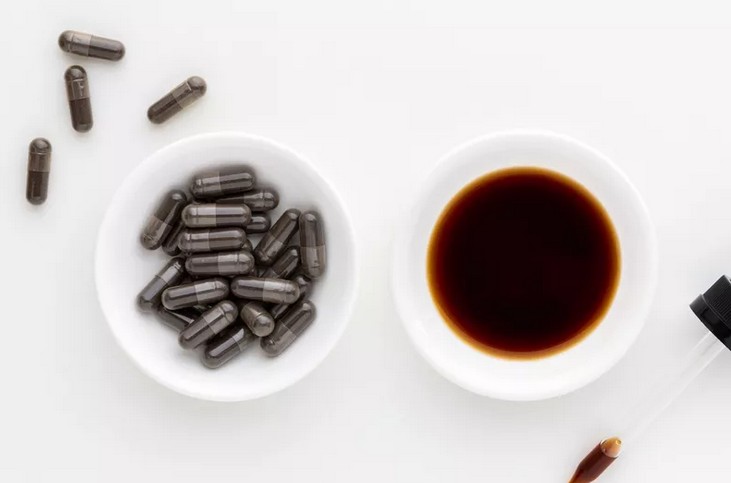
🙋♂️ Learning Online from the Field of Master Mind Herbs (MMHR) 🌳
Shared from the research of: Joseph Mercado 👦
Article Author: Cathy Wong 👩
Content Contributor: Very Well Health 🌏
Blog Post #1208 📌
Re: Black Walnut 🌰
Date and Time: Tuesday, March 8, 2022 at 11:45 a.m. ⏰
Dear Herbal Lover,
Black walnuts (Juglans nigra) are a type of tree nut said to offer a number of health benefits, including improved cardiovascular health measures.
These nuts contain tannins, a class of substances with antioxidant and anti-inflammatory properties.
They’re also high in unsaturated fat and protein.
Though research does not support the use of black walnut in preventing or treating health conditions, black walnut extract has long been used in herbal medicine.
Some recommend the supplement form to help treat certain illnesses, including infections.
Black walnuts are common in the United States, though not as common as English walnuts.
Both may be found in grocery stores and in the bulk bins at natural-food stores.
What Is Black Walnut Used For?
Some believe black walnut is useful as a natural remedy for the following health problems:
- Diabetes
- High blood pressure
- High cholesterol
- Colon and prostate cancer
- Intestinal worms
In addition, some say that black walnut can protect against heart disease, cancer, and infections caused by an overgrowth of yeast (such as yeast infections, candida, and thrush).
When applied topically, black walnut is said to aid in the treatment of Inflammatory skin disorders, like canker sores, psoriasis, and warts.
Black walnut does contain a host of beneficial components. In addition to those already mentioned, these include the essential fatty acids linoleic acid, oleic acid, palmitic acid, stearic acid, and linolenic acid (an omega-3), as well as minerals like magnesium and potassium.
But while a lot is known about the benefits of these components from a nutritional standpoint, there is not enough scientific evidence to support the use of black walnut or black walnut extract for these health benefits. (There is, however, evidence that increasing your nut consumption in general may boost heart health.)
Additionally, there are different types of black walnuts, and extracts from each may provide a different level of benefit (if any) based on their concentration of bioactive agents.
One study investigating the antibacterial properties of black walnut found variation between different types (cultivars).
Researchers examined 22 cultivars and found that one variety (Mystry) exhibited the strongest antibacterial activity.
One small study published in the Journal of Medicinal Food in 2011 compared the cardiovascular effects of black walnuts to those of English walnuts.
For the study, 36 people ate about 1.06 ounces of black walnuts or English walnuts every day for 30 days.
Study results showed that participants who added English walnuts to their diets experienced greater improvements in several measures of cardiovascular health compared to participants who added black walnuts to their diets.
However, other research suggests black walnuts may provide as much nutritional value, if not more, than the English walnut or other types of tree nuts.
Lastly, researchers are still investigating how to effectively extract the active compounds from the nut.6 Without proper extraction methods, supplements containing the bioactive compounds may not provide benefits at all.
Possible Side Effects:
Aside from reactions stemming from a tree nut allergy, consuming a reasonable amount of black walnuts poses little concern.
Eating nuts often or in excess, however, can lead to weight gain, as they are calorie-dense.
Some may experience gas, diarrhea, or other gastrointestinal issues as well.
Due to a lack of research, little is known about the safety of long-term use of supplements containing black walnut extract.
It’s important to note that self-treating a chronic health condition with black walnut and avoiding or delaying standard care may have serious consequences.
If you’re considering the use of black walnut in the treatment of a condition, make sure to consult your health care provider.
Selection, Preparation, and Storage:
When shopping for walnuts, you’ll usually find them in bags and in bulk bins, typically in the produce section of a grocery or natural-foods store.
Keep walnuts in the shell for as long as possible to preserve freshness. Once cracked open, keep them in your refrigerator (if you plan to eat them within a few days) or freezer (if you want to store them for longer).
According to some sources, if your walnuts smell like paint thinner, they are rancid and should be thrown away.
Often sold in liquid extract form, dietary supplements containing black walnut are available for purchase online and in natural-foods stores, drugstores, and shops specializing in dietary supplements.
Store them in a cool, dry place in their original container, and do not use them past their expiration date.
Common Questions:
I heard that black walnuts can be toxic. Is that true?
They may be toxic to animals. Black walnuts contain a toxin called juglone, and some research has shown that the substance may be dangerous to dogs and horses.
Do black walnuts taste different than other walnuts?
Black walnuts are often described as more earthy, dark, and bold than the more common English variety.
Black walnuts are usually grown wild and have a shell that is harder to crack.
Content Source: Very Well Health

 Email Us a Message
Email Us a Message 

Please send us a personal message below and we will serve you momentarily.
We appreciate you visiting the MMU Global Research Directory
For more blog posts, videos, articles, and to generate more knowledge, please feel free and…





 Fly Over to the MMU Facebook Page with Hoot
Fly Over to the MMU Facebook Page with Hoot
 Visit the MMA Facebook Group Today
Visit the MMA Facebook Group Today 